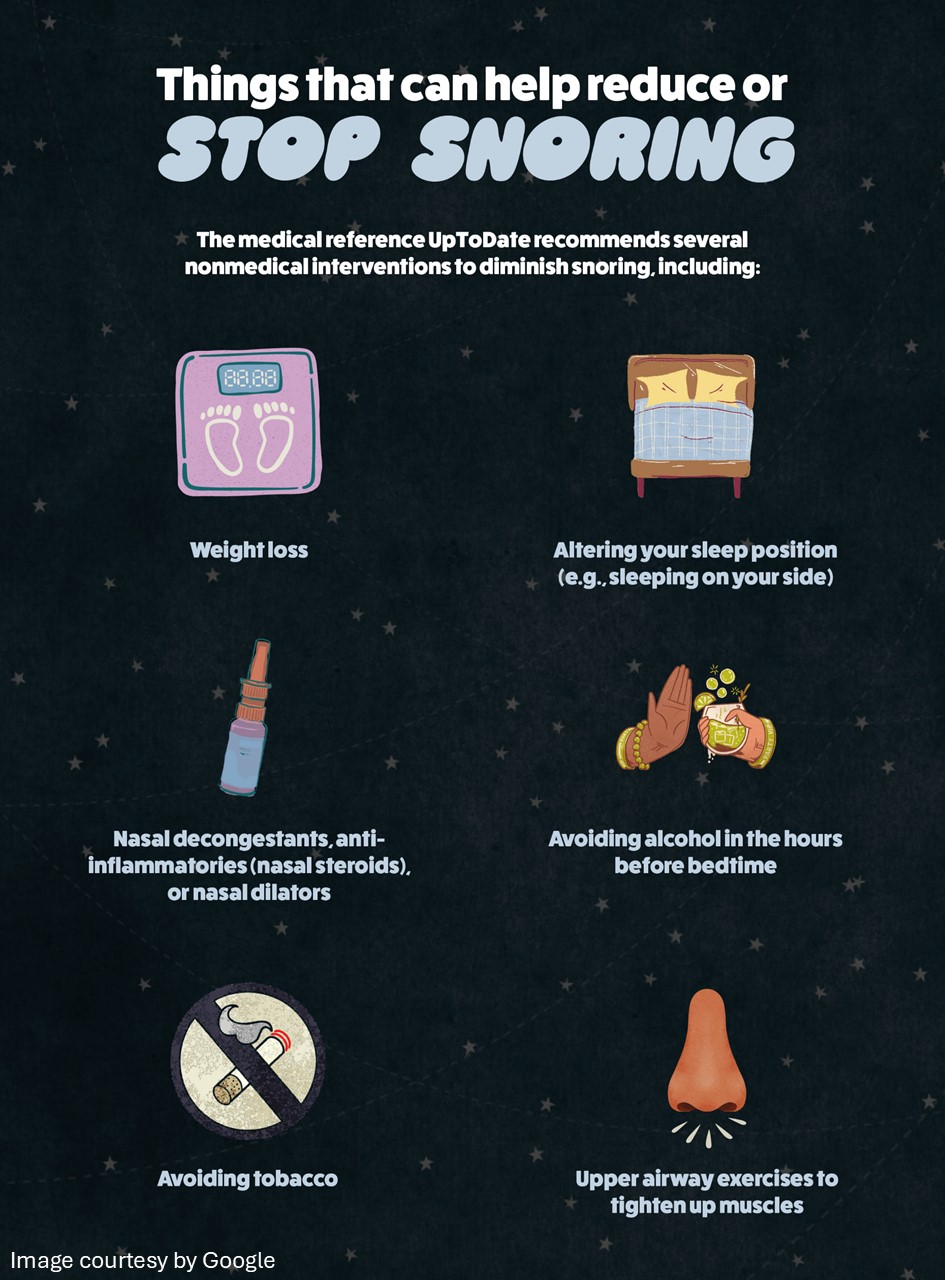Snoring may interfere with your sleep or that of a partner. It should not be ignored, even if it’s not bothering you. So, how to curb snoring? In this article, you will learn about effective ways to control snoring.
Snoring occurs when air flows through your throat while you sleep, causing the relaxed tissues in your throat to vibrate, which leads to harsh, possibly loud sounds. Loud snoring can be a sign of Obstructive Sleep Apnea. It is a disorder that disrupts your sleep for short periods and can lead to the risk of developing heart disease. Approximately 45% of normal adults snore at least occasionally. The way you sleep can be a significant factor in snoring. So, how to stop the habit of snoring? Choosing the right snoring treatment depends on the severity of your problem and your commitment towards the treatment. Use caution before you self-treat with OTC pills and sprays. Instead, try these snoring control tips and lifestyle changes, which may help you reduce or eliminate snoring.
Easy fixes for snoring
How to reduce snoring habits? Well, by making the following lifestyle changes, you can get a good night’s sleep and get rid of your snoring habit. A snoring cure is easy if you can implement some snoring control tips in your daily life. Yes, you heard it right, here we have compiled a list of possible ways to control snoring and breathe more easily.
-
- Make changes in your sleeping position
The chances of snoring loudly are greater when you sleep on your back. Yes, sleeping on your back can sometimes cause your tongue to move to the back of your throat, which restricts airflow to some extent through your throat. How to reduce snoring habits? All you need to do is sleep on your side, which allows air to flow easily and reduces and eliminates your snoring problem. You should try using special pillows, which are full-length pillows, to support your entire body. This type of pillow offers a quick fix, as it helps you maintain a side sleeping position and can make a dramatic difference. It enables you to turn left and right while sleeping, which can reduce the chances of snoring. If snoring persists regardless of the sleep position, obstructive sleep apnea may be the underlying cause of your loud snoring.
-
- Lose some pounds of weight
Weight loss is beneficial for some individuals, but not for everyone, as thin people can also snore. If you started snoring after gaining weight and did not snore before, weight loss may be a suitable option. Extra weight around your neck causes the internal diameter to be compressed, making it more likely to collapse during sleep and contributing to snoring episodes.
-
- Quit smoking
You should quit smoking if you are suffering from a sleep disorder like obstructive sleep apnea as smoking may worsen your condition. If you have sleep apnea, your body may not receive enough oxygen. Smoking reduces the amount of oxygen in your body, which can exacerbate sleep disorders.
-
- Avoid alcohol
We all know the effects of alcohol on our bodies. Excessive intake can harm the body to a great extent. Alcohol and other sedative substances reduce the resting tone of the veins and muscles in the back of your throat and make it more likely to snore. Studies on snoring state that drinking alcohol 4 to 5 hours before sleeping makes snoring worse. Even people who don’t normally snore will start snoring after drinking alcohol.
-
- Use nasal strips or a nasal dilator
Stick-on nasal strips are designed to be worn on the bridge of your nose to help widen the nasal passage. This makes breathing easy and reduces or eliminates your snoring. A nasal dilator is another option, which is made to be placed inside your nose and is also available.

See a sleep specialist
You should consult a sleep specialist if your snoring habit is moderate to severe or if you continue to snore despite making lifestyle changes. The healthcare professional will observe and evaluate your sleep disorder and will help you find the best solution for it. A healthcare expert will examine your mouth, nose, and throat and record your breathing patterns while you sleep. This may require an overnight stay at a sleep centre. Your doctor will prescribe the right snoring medication for you.
Healthcare professionals offer a wide range of treatment options to reduce snoring. The suitable option depends on several factors, including the severity of your snoring, your health history, and your personal preferences.
Non-surgical snoring treatments focus on enhancing your sleep posture and opening your airways. These include lifestyle changes, medications (such as cold and allergy medicines to relieve nasal congestion and help you breathe more easily), nasal strips, and oral appliances (such as mouthguards). Moreover, certain yoga postures help to close the mouth better and improve nasal breathing. While yoga may not cure the condition, it can certainly help alleviate the problem by addressing the underlying causes, such as stress, poor breathing, and muscle tension, which can lead to reduced snoring and an improved quality of life. Cobra pose (Bhujangasana) is an effective yoga practice for snoring control, helping to strengthen the throat muscles, open up the chest, and improve airflow.
Surgical Snoring treatment is to treat severe cases of snoring. Teh goal of surgery is to shrink or remove excess tissue or correct a structural issue.
Conclusion
Snoring is a common condition and is usually harmless. However, if you experience loud, chronic snoring that disrupts your sleep or that of your partner, it could indicate a serious problem.
Additionally, symptoms such as headaches, irritability, daytime fatigue, or gasping for air during sleep could be indicative of a sleep disorder, like sleep apnea. If you are unsure if snoring is affecting your health, make an appointment with a healthcare professional. They can help you determine the reason behind your snoring habit and whether you need treatment. Sound sleep is a crucial element of life as it relates to your overall health!
Also Read: Eight insomnia tips to help you fall asleep



